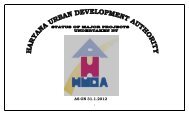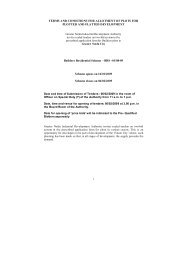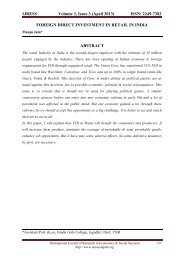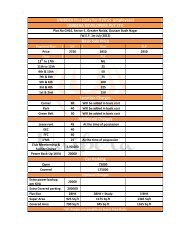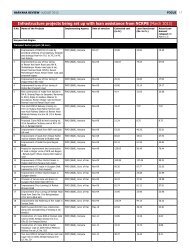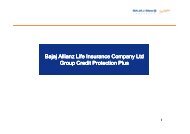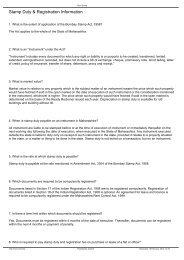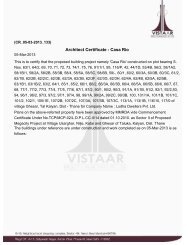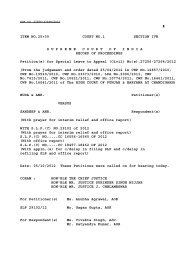eLegalix - Allahabad High Court Judgment Information System ...
eLegalix - Allahabad High Court Judgment Information System ...
eLegalix - Allahabad High Court Judgment Information System ...
Create successful ePaper yourself
Turn your PDF publications into a flip-book with our unique Google optimized e-Paper software.
JUDGMENT/ORDER IN - WRIT - C No. 37443 of 2011 at <strong>Allahabad</strong> Dated-21.10....http://elegalix.allahabadhighcourt.in/elegalix/WebShow<strong>Judgment</strong>.doPage 139 of 19710/21/2011take judicial notice of this fact. Now it is difficult to hold that in the case of proceedings relating to acquisition ofland for providing house sites it is unnecessary to invoke section 17(1) of the Act and to dispense with thecompliance with section 5-A of the Act. Perhaps, at the time to which the decision in Narayan Govind Gavate etc.v. State of Maharashtra, [1977] (1) S.C.R. 768 related the situation might have been that the schemes relating todevelopment of residential areas in the urban centres were not so urgent and it was not necessary to eliminatethe inquiry under section 5-A of the Act. The acquisition proceedings which had been challenged in that caserelated to the year 1963. During this period of nearly 23 years since then the population of India has gone up byhundreds of million and it is no longer possible for the <strong>Court</strong> to take the view that the schemes of development ofresidential areas do not ''appear to demand such emergent action as to eliminate summary inquiries underSection 5-A of the Act'....."Another judgment of the Apex <strong>Court</strong> which needs to be noted is in the case of Rajasthan Housing Board andothers vs. Shri Kishan and others reported in (1993)2 S.C.C. 84. In the said case also the Government had issueddirection for dispensation of inquiry under Section 17(4). The Apex <strong>Court</strong> examined materials which were beforethe Government on the basis of which it formed its opinion for directing dispensation of inquiry. The Apex <strong>Court</strong>approved the action of the Government after referring to relevant materials which were found sufficient forinvoking Section 17(4) of the Act. It is useful to quote following observations of the Apex <strong>Court</strong> which are inparagraph 14 of the judgment:-"14. ..... Secondly, we are satisfied that there was material before the government in this case upon which it couldhave and did form the requisite opinion that it was a case calling for exercise of power under Section 17(4). Thelearned Single Judge has referred to the material upon which the government had formed the said opinion. Thematerial placed before the <strong>Court</strong> disclosed that the government found, on due verification, that there was an acutescarcity of land and there was heavy pressure for construction of houses for weaker sections and middle incomegroup people; that the Housing Board had obtained a loan of Rs. 16 crores under a time-bound programme toconstruct and utilise the said amount by 31.3.1983; that in the circumstances the Government was satisfied thatunless possession was taken immediately, and the Housing Board permitted to proceed with the construction, theBoard will not be able to adhere to the time-bound programme. In addition to the said fact, the Division Benchreferred to certain other material also upon which the government had formed the said satisfaction viz., that inview of the time bound programme stipulated by the lender, HUDCO, the Board had already appointed a largenumber of engineers and other subordinate staff for carrying out the said work and that holding an inquiry underSection 5-A would have resulted in uncalled for delay endangering the entire scheme and time-schedule of theHousing Board. It must be remembered that the satisfaction under Section 17(4) is a subjective one and that solong as there is material upon which the government could have formed the said satisfaction fairly, the courtwould not interfere nor would it examine the material as an appellate authority. This is the principle affirmed bydecisions of this court not only under Section 17(4) but also generally with respect to subjective satisfaction."A three Judge Bench in the case of Chameli Singh and others vs. State of U.P. and others reported in (1996)2S.C.C. 549, again considered the question as to whether providing housing to the members of schedule caste(Dalit) under the scheme funded by the State, Section 17(4) of the Act can be invoked. In paragraph 14 of thejudgment, relying upon the judgment in the case of State of U.P. vs. Pista Devi (supra) it was observed thathousing accommodation to the Dalits and Tribes is in acute shortage hence invocation of Section 17(4) forproviding shelter cannot be said to be arbitrary. In paragraphs 14 and 15 of the judgment following was laid downby the Apex <strong>Court</strong>:-"14. What was said by Chinnappa Reddy, J. in the context of provisions of housing accommodation to Harijans isequally applied to the problem of providing housing accommodation to all persons in the country in State of U.P.v. Pista Devi [1986 (4) SCC 251] holding that today having regard to the enormous growth of population, urgencyclause for planned development in urban areas was upheld by a two-Judge Bench. The ratio of KasireddyPapaiah case 1975 AIR(AP) 269 : 1975 (1) APLJ 70] was quoted with approval by a three-Judge Bench inDeepak Pahwa v. Lt. Governor of Delhi [1984 (4) SCC 308 : 1985 (1) SCR 588]. The delay by the officials washeld to be not a ground to set at naught the power to exercise urgency clause in both the above decisions. Itwould thus be clear that housing accommodation to the Dalits and Tribes is in acute shortage and the State hasundertaken as its economic policy under planned expenditure to provide shelter to them on a war footing, incompliance with the constitutional obligation undertaken as a member of the UNO to the resolutions referred tohereinbefore."15. The question, therefore, is whether invocation of urgency cause under Section 17(4) dispensing with inquiryunder Section 5-A is arbitrary or is unwarranted for providing housing construction for the poor. In Aflatoon v. Lt.Governor of Delhi [ 1975 (4) SCC 285 ] (SCC at p. 290), a Constitution Bench of this <strong>Court</strong> had upheld theexercise of the power by the State under Section 17(4) dispensing with the inquiry under Section 5-A for the



